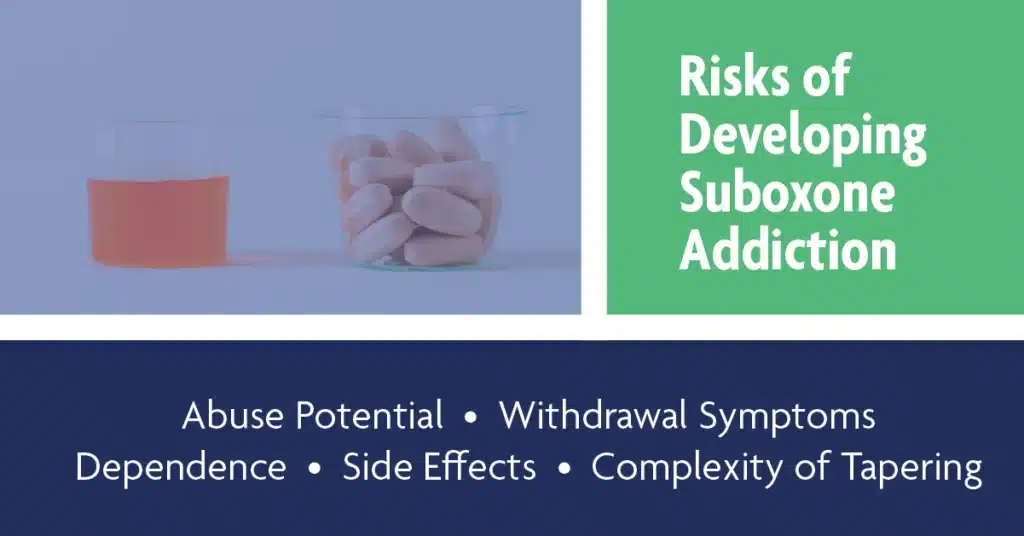As a parent, it is integral to be aware of the signs of Suboxone dependence early on so you can help your child get the support they need to overcome addiction.
Awareness is key in fostering a supportive environment and addressing Suboxone dependency effectively.
Key Takeaways
Parents must detect Suboxone dependence early and seek addiction treatment for their child. Here’s what you need to know:
- Suboxone addiction can manifest through distinct physical and psychological signs.
- Persistent nausea or vomiting can be a physical response to Suboxone and may indicate a problem.
- Heightened irritability or a short temper may be linked to the psychological effects of Suboxone.
- Addiction to Suboxone requires a comprehensive approach, including detox, therapy, and medication.
Our teen treatment center is committed to guiding teens toward lasting recovery from addiction. Call us at (845) 479-6888 for more information.

What is Suboxone?
Suboxone is a prescription drug often used to manage opioid dependence. This potent medication utilizes the benefits of two key components called buprenorphine and naloxone. Together, they form a formidable duo, providing a safe and effective solution to addiction recovery. As a partial opioid agonist, buprenorphine curbs cravings without the intense high.
However, Suboxone isn’t without drawbacks. Misuse or abrupt discontinuation can lead to withdrawal. It may cause side effects such as drowsiness, constipation, or headaches. Some teens may develop dependence, with prolonged use requiring careful tapering.
Importantly, Suboxone is a tool within comprehensive addiction treatment, not a standalone solution. Medical supervision is crucial to ensure safe usage and address potential pitfalls. It’s vital for teens prescribed Suboxone to follow medical guidance closely to maximize its benefits while minimizing risks.
Medical Purpose
Suboxone serves a vital medical purpose in the realm of addiction treatment for people. Comprising buprenorphine and naloxone, it aids those grappling with opioid dependence. Buprenorphine helps manage withdrawal symptoms and cravings, offering relief without inducing a powerful high. Naloxone acts as a safety net, discouraging misuse by triggering withdrawal if Suboxone is improperly used. This combination supports teens in their journey toward recovery by easing the challenges of opioid withdrawal.
Risks of Developing Suboxone Addiction
Suboxone, a medication designed for opioid addiction treatment, holds promise, but understanding the associated risks is essential for its safe and effective use.
- Abuse Potential: Suboxone, if not taken as prescribed, poses a risk of abuse, potentially leading to dependence.
- Withdrawal Symptoms: Abruptly stopping Suboxone can result in withdrawal symptoms, emphasizing the importance of gradual tapering under medical supervision.
- Dependence: Prolonged use may lead to physical and psychological addiction, necessitating careful management and monitoring.
- Side Effects: Suboxone can cause side effects, including drowsiness, constipation, and headaches, impacting a teen’s daily functioning.
- Complexity of Tapering: Discontinuing Suboxone requires a thoughtful tapering process to minimize withdrawal effects, highlighting the need for professional guidance.
- Interaction Risks: Suboxone may interact with other medications, emphasizing the importance of disclosing all medications to healthcare providers.
- Treatment Not a Cure: Suboxone is part of a broader addiction treatment plan and does not eliminate the need for counseling or other therapeutic interventions.
- Individual Variances: Response to Suboxone varies, making personalized medical supervision crucial for optimal outcomes.
Enhancing awareness of the risks associated with Suboxone usage promotes safer and more effective addiction treatment.
Signs of Addiction
Suboxone addiction can manifest through distinct physical and psychological signs. Identifying and interpreting these signals is pivotal to ensure swift intervention and support. Early acting on the cues is imperative to assist those in need.
Physical
Physical signs play a vital role in identifying potential substance addiction. The encompassing variations are:
- Coordination Issues: Noticeable difficulty in maintaining balance or coordination may indicate a physical impact of Suboxone misuse.
- Slurred Speech: Speech patterns may become slurred or unclear, reflecting the central nervous system’s response to Suboxone.
- Drowsiness: Excessive sleepiness or difficulty staying awake might signal the sedative effects of Suboxone misuse.
- Nausea or Vomiting: Persistent nausea or vomiting can be a physical response to Suboxone and may indicate a problem.
- Constricted Pupils: Pinpoint pupils, smaller than usual, can be a visible sign of opioid use, including Suboxone use.
It is important to understand physical indicators to support recovery from substance-related challenges.
Psychological
Psychological indicators provide insights into potential addiction. The helpful cues for identifying and addressing underlying issues are:
- Mood Swings: Unexplained and abrupt shifts in mood, from euphoria to irritability, may point to the psychological effects of Suboxone.
- Anxiety or Paranoia: Heightened anxiety or paranoia could be indicative of the psychological impact of Suboxone misuse.
- Social Isolation: Withdrawal from friends and family, coupled with increased secretive behavior, might suggest a psychological dependence on Suboxone.
- Neglect of Responsibilities: Disregarding personal, professional, or familial responsibilities may indicate a shift in priorities influenced by Suboxone use.
- Increased Irritability: Heightened irritability or a short temper may be linked to the psychological effects of Suboxone.
You can take the right step by identifying the earliest physical or psychological signs, paving the way for a faster recovery. Take immediate action when you spot the symptoms because it could make all the difference.
Dangers of Addiction
Misusing Suboxone can have severe consequences on one’s physical and mental health in both the short and long run. Learning the risks associated with such misuse and taking necessary precautions to safeguard your well-being is essential.
Short-Term Effects
Suboxone misuse can have life-threatening consequences. Don’t take any chances with your health; if you or someone you know is misusing Suboxone, seek immediate medical attention.
- Respiratory Depression: In the short term, Suboxone misuse can lead to slowed breathing, a severe condition that requires immediate medical attention.
- Drowsiness and Sedation: Excessive use of Suboxone can cause extreme drowsiness and sedation, impairing a teen’s ability to function normally.
- Nausea and Vomiting: Short-term effects may include persistent nausea and vomiting, contributing to physical discomfort and dehydration.
- Coordination Issues: Suboxone misuse can result in impaired coordination, raising the risk of accidents and injuries.
- Confusion and Disorientation: Teens may experience confusion and disorientation, affecting cognitive function and decision-making.
To ensure safety and avoid potential harm, you must seek professional help promptly. Prioritize your health and reach out for the support you need against drug abuse.
Long-Term Effects
Prolonged use of Suboxone can lead to a host of issues that can significantly impact your life. Aware of these likely risks and take steps to prevent them from happening.
- Physical Dependence: Long-term use of Suboxone can lead to physical addiction, where the body relies on the substance to function normally.
- Tolerance Development: Over time, teens may develop patience, needing higher doses to earn the same effects, increasing the risk of overdose.
- Psychological Dependence: Chronic use may contribute to psychological dependence, where children feel a firm emotional reliance on Suboxone.
- Impact on Mental Health: Long-term Suboxone misuse can exacerbate mental health issues, leading to conditions such as depression and anxiety.
- Social and Occupational Consequences: Suboxone addiction can have far-reaching consequences, affecting relationships, employment, and overall quality of life.
Parents need to know the risks associated with the misuse of Suboxone so that they can educate their teenagers about it. Only then can we empower ourselves and our loved ones to make informed decisions and stay safe.
Treatment
Overcoming Suboxone addiction involves a comprehensive approach, combining detoxification, therapy, and medication.
Detox: Detoxification is the initial step. It involves safely tapering off Suboxone under medical supervision to manage withdrawal symptoms. This process helps the body adjust without severe discomfort.
Therapy: Therapy plays an integral role in addressing the psychological aspects of addiction. Behavioral therapies, counseling, and support groups assist individuals in understanding triggers, building coping mechanisms, and fostering a healthier mindset.
Medication: Medication-assisted treatment (MAT) may involve drugs like buprenorphine to aid recovery. These medicines help reduce cravings and withdrawal symptoms, supporting a smoother transition towards a substance-free life.
Combining detox, therapy, and medication offers a holistic approach to Suboxone addiction treatment. Personalized plans tailored to individual needs increase the likelihood of successful recovery. Seeking professional guidance and keeping open communication with healthcare providers are vital steps on the path to overcoming Suboxone addiction.
Frequently Asked Questions (FAQ)
How does Suboxone affect personality?
Suboxone, a medication aiding opioid recovery, usually doesn’t alter personality. It is a medication for opioid addiction that acts on opioid receptors in the brain, easing cravings and withdrawal symptoms. It helps individuals break free from heroin or prescription painkiller abuse. Unlike opioids, Suboxone has a ceiling effect, limiting its potential for abuse.
Under a doctor’s supervision, the induction phase monitors patients for signs of Suboxone abuse. While it curbs illicit drug cravings, long-term use requires behavioral therapy. However, larger doses of Suboxone overdose may occur in unsupervised use, necessitating professional medical help. Always seek advice from a healthcare expert for personalized guidance.
How can I recognize Suboxone addiction in a loved one?
Recognizing Suboxone addiction in a loved one involves understanding opioid use disorder, where opioids affect the brain’s receptors. Suboxone, a prescription medication, is used in medication-assisted treatment, but its abuse can lead to substance use disorder.
Watch for physical symptoms like drug cravings, altered behavior, and mental health disorders. Many cases involve obtaining Suboxone through black markets or doctors. Treatment options include medical professionals, cognitive-behavioral therapy, and methadone.
The first step is identifying signs like altered behavior and seeking help through treatment programs. The opioid crisis demands immediate attention, and awareness is vital in combating this menace.
Residential Treatment for Teens
Join a haven of healing at our teen treatment center, where we specialize in crushing addiction to drugs and alcohol. We offer various helpful services that can bring your teen numerous benefits.
With our Suboxone treatment services, we provide personalized care, ensuring a tailored approach that supports a smooth and effective recovery. In our residential treatment programs, teens find a nurturing environment for healing, therapy, and skill development.
Our aim is not only to overcome addiction but also to establish a basis for long-term recovery. Call us at (845) 479-6888 to learn more.


